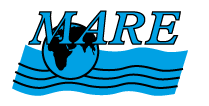News and Publications
In spring 2014, MARE prepared two teachers for a teacher-at-sea experience on board the Scripps Institute of Oceanography research vessel, the R/V Melville. The monthlong ocean acidification-focused research cruise, led by Chief Scientist William Cochlan of San Francisco State University, will travel from San Francisco, CA to Seattle, Washington. Follow their adventures on our Blogs we Like page.
In early 2012, MARE Director Craig Strang posted two open letters on several list serves, representing the community for increasing Ocean Literacy. To understand the historic opportunity available to us now to make strides in ocean sciences education, please read the Open Letter to Next Generation Science Standards Lead State Teams and the letter regarding the National Ocean Council's recently released draft implementation plan for President Obama's National Policy for Stewardship of the Ocean, Our Coasts and the Great Lakes.
In February 2011, MARE staff presented a two-day workshop for the Knauss Fellows, fifty marine science graduate students and post-docs who spend a year in Washington, D.C. working in science policy in the legislative and executive branches of government. The John A. Knauss Marine Policy Fellowships are sponsored by NOAA Sea Grant. The workshop, hosted by the Center for Ocean Science Education Excellence (COSEE), focused on how scientists can better communicate scientific concepts to the public. The workshop included sessions on public and scientific perceptions of the nature and process of science, how people learn and construct their knowledge of scientific concepts, and effective strategies for talking about science with diverse audiences.
MARE Director Craig Strang testified in Congress on February 4, 2010 before the House Appropriations Committee Subcommittee on Commerce, Justice and Science on the value of inquiry-based science education, and on the important role that science agencies such as NSF, NOAA and NASA play in the improvement of science education. Read his inspiring written testimony and his oral testimony here.
The Ocean Literacy Campaign is changing the way educators and the public think about ocean sciences education. Read about how the Ocean Literacy Campaign is bringing about a paradigm shift in the way educators and the public think about Ocean Sciences Education. Can You Be Science Literate Without Being Ocean Literate? Strang, C., Decharon, A., & Schoedinger, S. (2007).
Read Lynn Tran’s paper for the National Research Council, Children and adults’ understanding of ocean and climate sciences, to learn more about the latest studies on what people know and think about the ocean and climate as well as the thinking skills necessary for understanding these complex systems and teaching methods that support them.
Download the NMEA Special Report on Ocean Literacy Featuring the Ocean Literacy Scope and Sequence for Grades K-12 (co-edited by Craig Strang and Lynn Tran)! Check out this brand new tool for teachers, curriculum developers, standards committees and informal educators.
Learn more about our new Grants and Projects, Publications and Presentations, Awards and other News!




